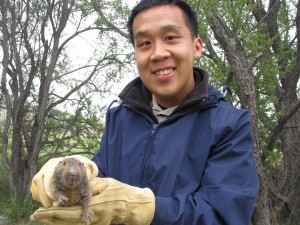My current scholarly interests are in biology education research and pedagogy, while my background and training have been in evolutionary genetics.
Biology education research and pedagogy
I view biology education research and the scholarship of teaching and learning as complementary to my teaching, where discoveries about teaching and learning strengthen my own teaching and those of others. My current pedagogical research focuses on three main areas: first, I assess the efficacy of various educational changes and programs at the classroom, department, and university levels on student learning, motivation, and self-efficacy. Second, I explore various factors that influence student learning both inside and outside the classroom to see how we can better support learning for all students. Finally, I develop new inquiry-based activities that promote learning in evolution, ecology, and beyond.
View my research group’s webpage here for more information on our biology education research projects!
The genetics of monarch butterfly migration
From 2009 to 2011, I conducted research in the lab of Dr. Marcus Kronforst, part of the Harvard FAS Center for Systems Biology. My research focused on examining the genetic basis of migration in monarch butterflies. Monarch butterflies (Danaus plexippus) are famous principally for their spectacular annual migration up through North America. However, the subspecies D. plexippus megalippe, which resides mostly in Central and South America, does not show migratory behavior. I focused on comparing these migratory and non-migratory relatives to determine the extent of their genetic divergence, and on identifying genes which may be involved in the evolution of migratory behavior.
Publications and media
-
- Zhan S, Zhang W, Niitepõld K, Hsu J, Haeger JF, Zalucki MP, Altizer S, de Roode JC, Reppert SM, and Kronforst MR. (2014) The genetics of monarch butterfly migration and warning colouration. Nature 514: 317-321.
- “Studying Royal Migration”, profile in The Harvard Crimson, October 2010
- Outreach, education vital to monarchs’ survival – quoted in the Santa Cruz Sentinel; gave public talk and poster on monarch ecology, evolution, and genetics and the “Welcome Back Monarchs” festival at Natural Bridges State Beach
- Profiled by the California Academy of Sciences:
Genetic changes in a tuco-tuco population following environmental perturbations
Working with my advisor, Dr. Elizabeth Hadly, and collaborator Dr. Eileen Lacey, I studied the impact of recent environmental perturbations, such as volcanic eruptions, on the population genetics of the tuco-tuco, a rodent genus endemic to South America. I focused on a specific population of Ctenomys sociabilis, a critically endangered species that lives in northern Patagonia, along the border of Chile and Argentina. Using genetic and genomic techniques, as well as theoretical modeling and ancient DNA, I investigated the changing genetic variability of this species in response to these environmental perturbations.
Publications:
- Hsu J., Crawford J.C., Tammone M.N., Ramakrishnan U., Lacey E.A., and Hadly E.A. 2017. Genomic data reveal a loss of diversity in two species of tuco-tucos (genus Ctenomys) following a volcanic eruption. Scientific Reports 7: 16227.
- Hsu J., Kam S.**, Tammone M., Lacey E.A., and Hadly E. A. 2017. Rapid increase in genetic diversity in an endemic Patagonian tuco-tuco following a recent volcanic eruption. Journal of Mammalogy 98(3): 779-792. ** denotes undergraduate mentored in lab
- Solari K.A., Frank H.K.*, Frishkoff L.O.*, Hsu J.*, Kemp M.E.*, Mychajliw A.M.*, and Hadly E.A. 2016. Opportunity for some, extinction for others: the fate of species in the Anthropocene. Evolutionary Ecology Research 17: 787-813. *authors contributed equally
